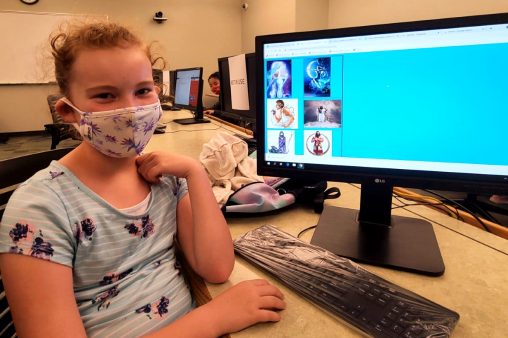
Discovery for children entering kindergarten through six grade and Camp Odyssey children entering grades seven through nine, run weekly through July 30 on the Dayton Campus.
Young campers have returned to Wright State University’s Dayton Campus this summer.
A year after Wright State’s Summer Enrichment Program had to offer online camps because of the pandemic, the annual Discovery and Camp Odyssey are once again offering in-person activities.
“It’s brought new life to the campus,” said Sheila Nahrgang, associate director of event services and youth programs at Wright State. “If you’re lucky enough to be on campus for a while, to see some semblance of normalcy with having our campers back for the summer has been great.”
The campers and their parents are also excited to be back.
“I think children are ready to just get out and play and enjoy each other’s company again,” Nahrgang said.
Offered by Wright State’s Pre-College Programs, the summer enrichment courses are designed to encourage children’s creativity and enthusiasm for learning. Teachers and professionals from the Miami Valley provide educational and challenging learning environments that encourage creativity and critical thinking.
Discovery is designed for children entering kindergarten through six grade, and Camp Odyssey is open to children entering grades seven through nine.
Topics include science, nature, history, art, filmmaking, astronomy, geography, computing and coding, archaeology, reading and more.
Camps opened June 1 and run weekly through July 30. The fee for each weekly session is $140.
More details, including registration information, are available on the Pre-College Program’s website.
Pre-College Programs implemented a plan to safely host children on campus this summer, Nahrgang said. Safety procedures are similar to what most area schools have put in place, she said.
Campers and staff must wear masks indoors and practice physical distancing. Students must stay with their class and cannot co-mingle with students from other classes.

Wright State’s summer enrichment courses are designed to encourage children’s creativity and enthusiasm for learning.
Staff must perform self-health assessments before traveling to campus every morning.
If Pre-College Programs is notified that a student has been diagnosed with COVID-19, parents or guardians of classmates will be notified by email and phone. CDC guidelines for quarantine will be enforced.
The number of camps and children has been reduced this summer. Seven camps are offered each week, compared with 13 in previous years, with a maximum of 15 students per session.
As of early June, Nahrgang said, 750 students had registered for a camp, about 80% of the program’s capacity.
“We’re happy to be back,” she said, “and we look forward to the rest of summer with our students and building those relationships with the community again.”
Although thrilled to offer in-person camps once again, Nahrgang said Pre-College Programs may introduce additional programing based on staff’s experience with last summer’s virtual campus. This could include offering online courses to give more children opportunities to participate.

 Wright State to expand nursing facilities to meet workforce needs and prepare more graduates for in-demand careers
Wright State to expand nursing facilities to meet workforce needs and prepare more graduates for in-demand careers  Wright State student-athletes make a lasting impact on local family with more to come
Wright State student-athletes make a lasting impact on local family with more to come  Wright State names Rajneesh Suri dean of Raj Soin College of Business
Wright State names Rajneesh Suri dean of Raj Soin College of Business  ‘Only in New York,’ born at Wright State
‘Only in New York,’ born at Wright State  Wright State president, Horizon League leaders welcome new commissioner
Wright State president, Horizon League leaders welcome new commissioner 